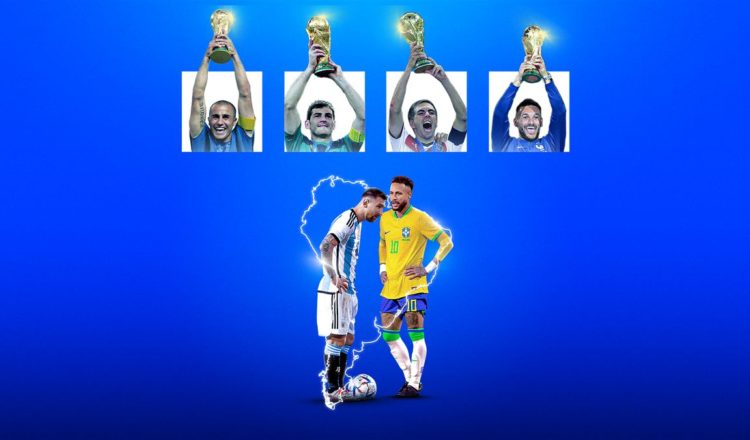By the time the 2022 World Cup kicks off in Qatar, it will have been over 20 years since two goals from Ronaldo sealed a fifth World Cup for Brazil.

Seleção’s 2-0 win over Germany continued a sequence of Europe and South America alternating World Cup wins, dating back to 1962, and even in the six tournaments prior to that, the two continents had three wins apiece to boast of.
However, since that glorious evening in Yokohama, the balance of power has very much shifted, with the subsequent four winners (Italy, Spain, Germany, France) all coming from Europe.
Historically, European sides simply didn’t win the tournament outside of Europe until Spain’s victory in South Africa in 2010. With Brazil on hosting duties four years later, any expectation of normal service being resumed was blown out of the water emphatically.
In arguably the most remarkable football match to ever take place on the biggest stage, the hosts suffered total humiliation as they were annihilated 7-1 by a rampant Germany in the semi-final in Belo Horizonte.
The Germans then went on to beat Argentina 1-0 in Rio to take the crown. A match which featured a staggering miss from Gonzalo Higuain which could have given Argentina a crucial lead early on.
For South America’s big two, despite Olympic and Copa America success for both in the interim period, it has been far too long without a World Cup to boast of.
However, both sides are in a position, and very much determined, to bring that drought to an end in the coming weeks.
BRAZIL’S TALENT OVERLOAD
Both teams wrapped up qualification early in what is an otherwise daunting looking CONMEBOL qualifying group made up of South America’s finest, with neither losing any of their 17 respective matches.
Brazil have topped the group with ease, winning 14 of their 17, scoring 40 goals in the process, while conceding just five.
Huge wins over Uruguay (4-1), Chile, Paraguay (both 4-0) and Bolivia (5-0) have served to demonstrate the imperious form they find themselves in under manager Tite who has gone some way to instilling defensive discipline while trying to harness the attacking flair much-desired by observers in the country.
In Alisson Becker, few would dispute Brazil currently have the best goalkeeper in the world (or at the very least, top three) and while the defence is still calling on the likes of Thiago Silva and Dani Alves, these two players are defying their ages to still perform at an elite level.
Fabinho, Bruno Guimaraes, a surprisingly effective Fred and Casemiro are all available in a highly talented midfield and despite his apparent troubles with Paris Saint-Germain, Neymar remains the spearhead of Brazil’s attack as his eight goals in qualifying so far show.
Alongside him, the likes of Richarlison, Vinicius Jr, Raphinha, Rodrygo, Antony and Gabriel Martinelli present an embarrassment of riches as far as attacking talent is concerned.
ARGENTINA’S PLANS FOR QATAR AND BEYOND
Brazil are currently bookies favourites to claim their sixth trophy and end the South American dry spell, but their nearby neighbours will also consider themselves ready for a shot at glory and a first World Cup since 1986.
Having named a hefty 48-man preliminary squad for the tournament as early as September, manager Lionel Scaloni and the Argentinean FA are clearly looking to harvest all the possible talent available to maximise their chances in the Middle East later in the year and beyond.
Inter Milan teenager Valentin Carboni, who holds dual nationality with Italy was among the call-ups as was Real Madrid’s Nicolas Paz and Manchester United youngster Alejandro Garnacho – effectively to convince them not to play for Spain. None made the final squad but the future looks bright
Even with one eye on the future, the current selection options ahead of the World Cup still contain the experience of Angel Di Maria, Lautaro Martinez and Spurs defender Cristian Romero.
And of, course, it would take a brave man to write off a certain Lionel Messi especially looking at his ominous return to form recently in Paris.
Manchester City summer signing Julian Alvarez is also keen to impress and will add firepower to the frontline going forward.
After a 0-0 draw between the two in San Juan, Brazil and Argentina curiously were never required to fulfil the reverse fixture from the qualifying campaign after the original match in Sao Paulo was suspended amid farcical scenes as health officials attempted to apprehend four then-British based players failing to abide by strict coronavirus protocols.
With no bearing on qualification beyond the bragging rights between the two, it was agreed not go ahead with the rescheduled encounter.
Many will perhaps be anticipating the game finally taking place somewhere down the line in Qatar – a semi-final meeting could be on the cards should both teams top their groups as expected.
With both teams certainly looking equipped to break the European dominance of the World Cup, the trophy could finally be making its way back to South America.













